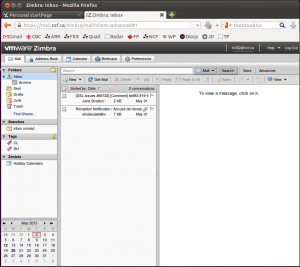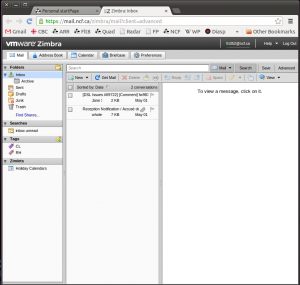Difference between revisions of "Browsers"
(more text, headings) |
(more) |
||
| Line 11: | Line 11: | ||
Microsoft Windows systems come with Internet Explorer (IE), which is a browser that has a long history of issues and has generally not been standards compliant. Modern versions of IE, like IE9 and IE10, are supposed to be standards compliant, but testing shows that they do not render standards compliant web pages, like NCF's [[Zimbra]] web mail pages, properly, which can cause problems. | Microsoft Windows systems come with Internet Explorer (IE), which is a browser that has a long history of issues and has generally not been standards compliant. Modern versions of IE, like IE9 and IE10, are supposed to be standards compliant, but testing shows that they do not render standards compliant web pages, like NCF's [[Zimbra]] web mail pages, properly, which can cause problems. | ||
The Zimbra web mail interface looks the same in the three standards compliant browsers illustrated on the right, which is the way it should work! | |||
==Getting a new browser== | ==Getting a new browser== | ||
Revision as of 08:06, 2 May 2013
Internet web pages are usually designed to conform to internationally accepted standards set by the World Wide Web Consortium (W3C). As long as the web page is standards compliant and you use a browser that is also standards compliant then the page will render the way it is supposed to.
These days all operating systems come with web browsers installed, but some are better than others.
Linux and BSD-based operating systems often come with Firefox or Chromium, which are excellent browsers and both standards compliant. Android based systems, which are also Linux, often come with Google Chrome, which is also a very good and standards compliant browser.
Apple products, including iPads and iPhones, usually come with Safari, which is a good standards compliant browser as well.
Microsoft Windows systems come with Internet Explorer (IE), which is a browser that has a long history of issues and has generally not been standards compliant. Modern versions of IE, like IE9 and IE10, are supposed to be standards compliant, but testing shows that they do not render standards compliant web pages, like NCF's Zimbra web mail pages, properly, which can cause problems.
The Zimbra web mail interface looks the same in the three standards compliant browsers illustrated on the right, which is the way it should work!
Getting a new browser
Rather than use IE, NCF recommends that you use other alternate, standards compliant browsers, all of which are available for free, such as:
- Apple Safari for Mac OSX
- Gnome Epiphany for Linux
- Google Chrome for BSD, Linux, Mac OSX, and Windows
- Mozilla Firefox for BSD, Linux, Mac OSX, and Windows
- Mozilla SeaMonkey for BSD, Linux, Mac OSX, and Windows
- Opera for BSD, Linux, Mac OSX, and Windows
- SRWare Iron for BSD, Linux, Mac OSX, and Windows
Old browsers
Internet standards change over time and browsers are updated regularly. Using older, outdated versions of web browsers is not recommended for several reasons:
- newer versions usually have fixed identified security issues, meaning that by using older browser versions you could compromise your computer
- newer browser versions incorporate newer features that show modern web pages properly. For instance older browsers will not support modern HTML5 or Ajax, which makes modern interactive sites, like Zimbra work.
Use the most up to date version of your favourite browser, that way web pages will work right and you will be more confident that old security vulnerabilities have been addressed.



